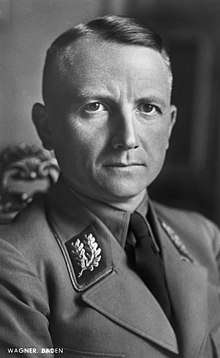Robert Heinrich Wagner
You can help expand this article with text translated from the corresponding article in German. (February 2009) Click [show] for important translation instructions.
|
Robert Heinrich Wagner | |
|---|---|
 Robert Wagner | |
| Gauleiter of Gau Baden (from 22 March 1941, Gau Baden-Elsaß) | |
| In office 25 March 1925 – 8 May 1945 | |
| Deputy | Karl Lenz (1926–31) Walter Köhler (1931–33) Hermann Röhn (1933–45) |
| Preceded by | Office established |
| Succeeded by | Office abolished |
| Reichsstatthalter of Baden | |
| In office 5 May 1933 – 8 May 1945 | |
| Preceded by | Office established |
| Succeeded by | Office abolished |
| Chief of Civil Administration for Alsace | |
| In office 2 August 1940 – 23 November 1944 | |
| Preceded by | Office established |
| Succeeded by | Office abolished |
| Personal details | |
| Born | Robert Heinrich Backfisch 13 October 1895 Eberbach, Grand Duchy of Baden, German Empire |
| Died | 14 August 1946 (aged 50) Fort de Roppe, Belfort, France |
| Cause of death | Execution by firing squad |
| Nationality | German |
| Known for | Forced reintegration of Alsace into the German Reich |
| Military service | |
| Allegiance | |
| Branch/service | Imperial German Army Reichswehr |
| Years of service | 1914–1924 |
| Rank | Oberleutnant |
| Unit | 110th Grenadier Regiment 110th Reserve Regiment 113th Defense Regiment 14th Infantry Regiment |
| Battles/wars | World War I November Revolution Beer Hall Putsch |
| Awards | Iron Cross, 1st and 2nd class |
Robert Heinrich Wagner, born as Robert Heinrich Backfisch (13 October 1895 – 14 August 1946) was a
Early life
Robert Wagner was born in
At the outbreak of the
In February 1919, Wagner joined the 2nd Baden Volunteer Battalion, with whom he participated in the suppression of revolutionary unrest in Mannheim and Karlsruhe. This unit was transferred to Reichswehr 113th Defense Regiment in March 1920. In January 1921, he was transferred to the 14th Infantry Regiment, based in Konstanz. Also at this time, he officially had his name changed to Wagner, taking the maiden name of his mother.[5] The reason for the name change from his father's (Backfisch, which means "teenage girl" (literally "fried fish")) was probably to avoid teasing by his fellow officers.
Hitler meeting
In September 1923, by now an

Nazi Party career
When the
Following the
Second World War and Chief of Civil Administration in Alsace
Shortly after the outbreak of the
On 25 August 1942, Wagner issued a decree ordering the conscription into the Wehrmacht on all Alsatian men of military service age. This policy was very unpopular and had the effect of increasing opposition to the German occupation. In February 1943, Wagner ordered the execution of 12 men from Ballersdorf who tried to avoid compulsory military duty by attempting to cross into nearby Switzerland.[12]
Wagner also embarked on a campaign to rid Alsace of Jews, earning the nickname the Butcher of Alsace (Schlächter vom Elsaß). On 22 October, he initiated a massive deportation of Jews to areas in unoccupied France (
On 16 November 1942, the jurisdiction of
Capture, trial and death
On 29 April 1945, Wagner went into hiding, posing as a farmhand near
On 1 September 1950, Wagner was posthumously classified as a major offender (Category I) by the denazification court in Baden.[17]
References
- ^ "Rhein-Neckar Zeitung/Nr. 261", Milde Strafen für die Täter, Rhein-Neckar-Zeitung GmbH, p. 13, 2008-11-08
- ^ "Robert Wagner – Stadtlexikon". stadtlexikon.karlsruhe.de. Retrieved 2020-03-13.
- ^ a b c d e "Milde Strafen für die Täter". Rhein-Neckar Zeitung/Nr. 261 (in German). Rhein-Neckar-Zeitung GmbH. 8 November 2008. p. 13.
- ^ Miller & Schulz 2021, p. 573.
- ^ Miller & Schulz 2021, p. 574.
- ^ Miller & Schulz 2021, p. 575.
- ^ a b c Höffkes 1986, p. 373.
- ISBN 978-0-582-48997-4
- ^ Miller & Schulz 2021, p. 572.
- ^ "Wagner, Robert Heinrich". Retrieved 2020-08-27.
- ^ Miller & Schulz 2021, pp. 584–585.
- ^ Miller & Schulz 2021, p. 589.
- ^ Miller & Schulz 2021, p. 585.
- ^ Miller & Schulz 2021, pp. 590–592.
- ^ "Wagner Robert Heinrich - Detailseite - LEO-BW". www.leo-bw.de. Retrieved 2020-03-13.
- ^ "Robert Wagner – stadtlexikon". stadtlexikon.karlsruhe.de. Retrieved 2020-08-27.
- ^ Miller & Schulz 2021, p. 593.
Sources
- Höffkes, Karl (1986). Hitlers Politische Generale. Die Gauleiter des Dritten Reiches: ein biographisches Nachschlagewerk. Tübingen: Grabert-Verlag. ISBN 3-87847-163-7.
- Miller, Michael D.; Schulz, Andreas (2021). Gauleiter: The Regional Leaders of the Nazi Party and Their Deputies, 1925 - 1945. Vol. 3 (Fritz Sauckel - Hans Zimmermann). Fonthill Media. ISBN 978-1-781-55826-3.
External links
- Information about Robert Heinrich Wagner in the Reichstag database
- Trial of Robert Wagner, Gauleiter and Head of the Civil Government of Alsace during the Occupation, University of West England.
- Vidéo INA, The Trial of Robert Wagner, Les Actualités Françaises, 2 mai 1946.
- The Trial of Robert Wagner, site malgre-nous.eu - pdf.
